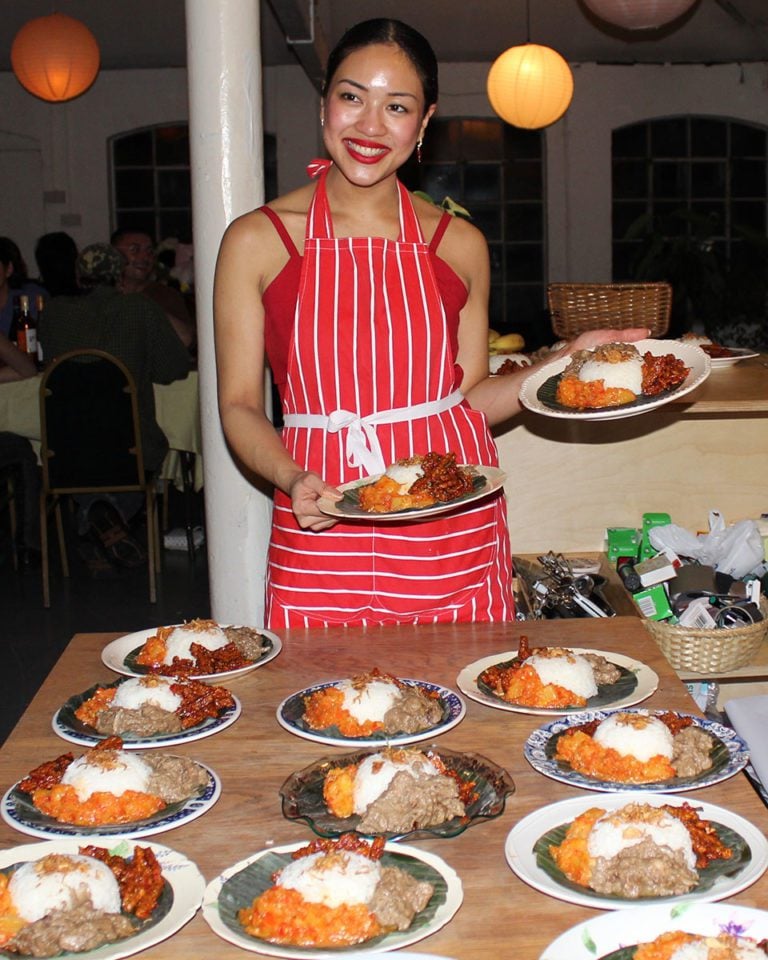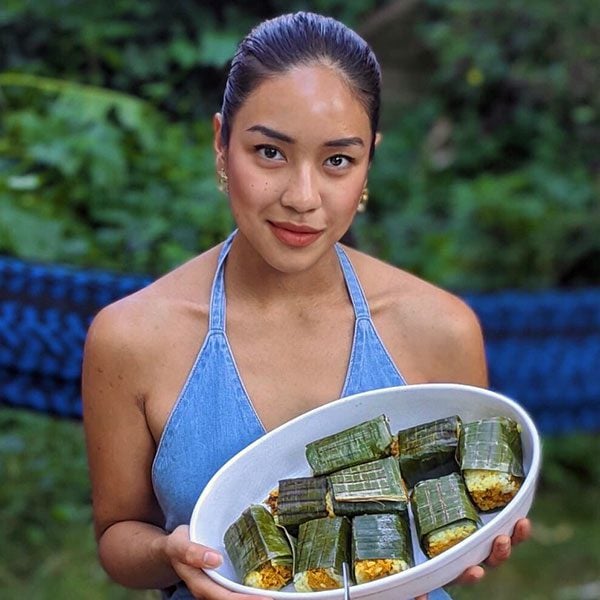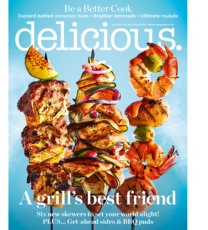Five minutes with Rahel Stephanie
Rahel Stephanie is a cook and entrepreneur on a mission to dispel misinterpretations of Indonesian food. Her plant-based supper clubs ‘Spoons’ sell out in seconds.
Rahel moved to London at 19 to study and noticed how inaccurately her country’s cuisine was represented here, with almost no Indonesian restaurants in London. She is now working to put authentic Indonesian food firmly on the UK map.
Rahel’s popularity hasn’t stopped with her supper clubs, she has partnered with big fashion brands such as Flannels and GANNI with more exciting things to come very soon…

What’s your very first memory of food?
I used to obsess over Indomie instant noodles from a very young age (and still do) so much that my mom had to ration this to once a week. To me, it was a weekend treat I’d look forward to all week. I’d have it for breakfast while watching a TV show, eating it as slowly as I could to savour every last second of it, before having to wait for a whole other week. This must have started from when I was 4 years old and went on for the rest of my childhood. We’d always have a whole kitchen cabinet dedicated to packs and packs of Indomie.
What’s the first recipe you properly learned to make?
I’m pretty sure it was a recipe for Rum Balls my mom taught me, also at the age of 4. It was a very easy 3-ingredient (or 4 if you throw the actual rum in) no-bake recipe of crushed Marie biscuits, chocolate condensed milk and chocolate sprinkles. It gets mixed together and rolled into little balls. We used to make it on the weekends as a fun activity. She even came to my kindergarten class once to do a demonstration and gave my classmates cute rum ball certificates to take home. For the most part of my childhood, my parents became less and less involved in these kinds of parent-child bonding activities so thinking of these has really brought me back to some tender, optimistic times.
What do you like to do to relax?
To be completely honest this is still something I struggle to do. I have ADHD, get bored easily, and struggle to let myself really rest. When I think I’m chilling I always end up getting distracted… researching recipes or something. I guess it used to be cooking, but now that I’ve grown so much with Spoons at a professional level it’s no longer a hobby. I got myself a piano to relearn and take up as a hobby, so I should really try and commit more to that as a mode of relaxation.
What’s the one dish you can’t live without?
Undoubtedly, a red spicy sambal. I would add sambal to any and every savoury dish if I could.
What ingredient would you take to a desert island with you?
Garlic. Everything salty is better with garlic and you can never have enough garlic.

You can have a one-off dinner party on your island… who would you invite?
It would be my younger sister Becky. She’s my best friend and we can spend hours on end just hanging out with each other.
What cookbook means the most to you?
Sri Owen’s Indonesian Regional Food & Cookery is a big inspiration to me. Having published the first Indonesian cookbook written in the English language, she provides unapologetic and extensive context. One of my favourite lines is “I hope to rescue the average Indonesian menu from its familiar litany of nasi goreng”. Goals! She also covers an extensive range of Indonesian dishes across the archipelago, giving the diversity of regions the representation they deserve.
"I would add sambal to any and every savoury dish if I could."
Indonesian food is little understood in the UK. How do you find people’s attitudes to the cuisine in general?
I think that a lot of people have a very skewed perception of Indonesian cuisine. Most times it feels like the only dishes people have heard of are Nasi Goreng, Gado-Gado and Satay. Many don’t realise the breadth of Indonesian cuisine and its regions. We’ve got over seventeen thousand islands and about 300 different ethnicities – this diversity is naturally reflected in the nation’s food.
I notice so many misinterpretations and appropriations of elements from our cuisine. One of my favourite examples is how lots of people don’t realise that the word satay in Indonesian merely refers to any skewered dish – of which we have 252 in total! On the UK high street, you’ll find ‘satay rice boxes’, ‘satay sauces’ and ‘satay salads’ – all with no skewer in sight. There seems to be a misconception in equating ‘satay’ with ‘peanut sauce’.
You’ve been running Spoons supper clubs and dinner parties for years now. Can you tell us about your favourite menu you created?
It’s got to be a menu I served when I used to do home deliveries at the beginning of the pandemic. It featured the banana blossom sambal menu: Crunchy Battered Banana Blossom in Sambal Matah (raw and fragrant Balinese relish) and Pandan Berry Blondies – two of my favourite creations to date and both created in lockdown. I had a lot of time for innovation…
It’s 8pm, you’ve just got home. What are you rustling up?
It would be a rice cooker meal. My rice cooker comes with a steaming basket so I’d have the rice cooking in the bottom, and maybe a salmon fillet steaming away in the basket. I’d serve it with some homemade sambal (I’m never without a jar in the fridge) and blanched vegetables on the side, and sprinkled with furikake or crispy fried shallots. It’s so easy ’cause all I’ve got to do is pop the rice cooker on while I wind down for the next 20 minutes.
I can’t believe I spent my first few years in London without a rice cooker. My kind friend Lois gifted me her old one, which I exchanged for a Spoons Pandan cake. Best swap ever. I urge everyone without a rice cooker to get one as a matter of priority.
Where do you source Indonesian ingredients in the UK?
Over the years I’ve definitely gained a firm grasp of which stores sell the ingredients I need, as it can be scattered across various East and Southeast Asian, South Asian, African and Carribean stores. I’ve learnt a lot about how certain ingredients I had assumed were Indonesian-centric were often incorporated in other cuisines. For example, finding chayote in African stores blew my mind! Chayotes are also called Labu in Indonesia, which actually directly translates into English as pumpkin.
A lot can get lost in translation so that also added to the confusion when I was searching through specific ingredients in London. Another example is Kencur. I had to look up the scientific name for Kencur on Google to find that its English name is Sand Ginger, but lots of East Asian stores that stock these would just label it as “Ginger” under Chinese characters. So I had to bring up the Chinese characters on my phone to do a side by side comparison with all these packets of dried spices. I found it though, and it’s the most unique spice, nothing else quite comes close. So it was worth it. With certain ingredients I absolutely cannot find, I’ve found some pretty good substitutes – you learn to work with what you’ve got sometimes! I also started growing turmeric on our window sill so I can harvest the leaves for Rendang. You get turmeric roots everywhere here, but not the leaves!
You’ve worked with some huge fashion brands in the past. Can you tell us a bit about those collaborations and any others you have coming up?
Whenever I’m casted for something based on what I do with Spoons, I always get a fuzzy feeling for being acknowledged through my passion project. For example, I did a campaign for Flannels’ SS22 collection and they casted some amazing individuals or what they’ve called “cultural catalysts”, each doing a different thing – from a musician to a poet to an artist to a dancer to little old me being a cook. I was extremely flattered. I’d come in for hair and makeup and people would be like, “Oh you’re the chef!” I walked onto the set and found like 20 cakes with “Rahel” and “Spoons” iced over all of them. That was really cute.
Is there anything about the food industry that bugs you? What are your thoughts on ‘fusion foods’?
I’m not against contemporary reinterpretations of traditional cuisines, or “fusion foods”, per se. What frustrates and angers me is the appropriation of foods without attention given to the cultural and historical contexts. It’s so disrespectful to centuries of tradition and will eventually lead to their erasure.
Can you tell us a bit about your cooking aspirations and dreams?
I cook for the culture! My aspirations go beyond serving up tasty authentic Indonesian dishes. I want to work towards reclaiming, decolonising, and celebrating foods of my heritage. I want to continue raising awareness about the historical contexts of my culture, taking down one skewerless satay at a time.
Follow Rahel on Instagram here.
Subscribe to our magazine
Food stories, skills and tested recipes, straight to your door... Enjoy 5 issues for just £5 with our special introductory offer.
Subscribe
Unleash your inner chef
Looking for inspiration? Receive the latest recipes with our newsletter